Robert hooke Study guides, Class notes & Summaries
Looking for the best study guides, study notes and summaries about Robert hooke? On this page you'll find 792 study documents about Robert hooke.
Page 4 out of 792 results
Sort by
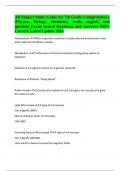
-
All Subject Study Guide for 7th Grade Comprehinsive (Physics, biology, chemistry, math, english, and spanish) Exam| Actual Questions and Answers 100% Correct| Latest Update 2024
- Exam (elaborations) • 49 pages • 2024
-
- $17.99
- + learn more
Homeostasis When organisms maintain a stable internal environment even when external conditions change Metabolism Combination of chemical reactions taking place within an organism Stimulus A signal to which an organism responds Biosphere Means "living planet" Robert Hooke Scientist who looked at cork through a microscope and gave the name to cells Light Microscope A type of microscope Can magnify 1000x Not as strong as other microscopes Uses light Scanning Electron Microscope A typ...
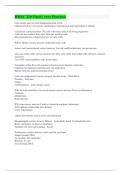
-
BMSC 220 Final || very Flawless.
- Exam (elaborations) • 46 pages • 2024
-
Available in package deal
-
- $17.49
- + learn more
Cell correct answers The fundamental unit of life Characterized by: movement, metabolism, reproduction and responding to stimuli Cell theory correct answers The cell is the basic unit of all living organisms Cells are not created, they arise from pre existing cells All organisms are composed of one or more cells Robert Hooke correct answers coined the term "cell" Anton van Leeuwenhoek correct answers Viewed small prokaryotes via microscope Can you create cells? correct answers N...
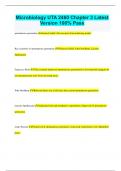
-
Microbiology UTA 2460 Chapter 3 Latest Version 100% Pass
- Exam (elaborations) • 17 pages • 2024
- Available in package deal
-
- $9.99
- + learn more
Microbiology UTA 2460 Chapter 3 Latest Version 100% Pass spontaneous generation ancient belief: life can arise from nonliving matter Key scientists of spontaneous generation Francesco Redi, John Needham, Lazzaro Spallanzani Francesco Redi This scientist disproved spontaneous generation by showing that maggots do not spontaneously arise from decaying meat. John Needham Believed there was a life force that caused spontaneous generation Lazzaro Spallanzani replicated redi and ne...
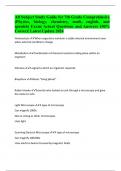
-
All Subject Study Guide for 7th Grade Comprehinsive (Physics, biology, chemistry, math, english, and spanish) Exam| Actual Questions and Answers 100% Correct| Latest Update 2024
- Exam (elaborations) • 49 pages • 2024
-
- $12.49
- + learn more
Homeostasis When organisms maintain a stable internal environment even when external conditions change Metabolism Combination of chemical reactions taking place within an organism Stimulus A signal to which an organism responds Biosphere Means "living planet" Robert Hooke Scientist who looked at cork through a microscope and gave the name to cells Light Microscope A type of microscope Can magnify 1000x Not as strong as other microscopes Uses light Scanning Electron Microscope A typ...
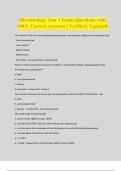
-
Microbiology Test 1 Exam Questions with 100% Correct Answers | Verified | Updated
- Exam (elaborations) • 27 pages • 2024
- Available in package deal
-
- $13.49
- + learn more
Microbiology Test 1 Exam Questions with 100% Correct Answers | Verified | Updated The Scientist That first saw and described protozoans and bacteria calling them animacules was: - Van Leeuwenhoek - Louis Pasteur - Robert Hooke - Robert Koch - Paul Erlich - answerVan Leeuwenhoek Which of these scientist(s) was/were involved in, among other things, investigating the idea of spontaneous generation? a. Redi b. van Leeuwenhoek c. Pasteur d. Escherich - answerc. Pasteur The scientist tha...
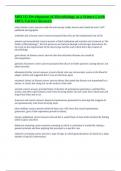
-
MBI 111 Development of Microbiology as a Science || with 100% Correct Answers.
- Exam (elaborations) • 5 pages • 2024
-
Available in package deal
-
- $10.49
- + learn more
robert hooke correct answers made the microscope widely known and coined the term "cell". published micrographia. schleiden and schwann correct answers proposed that cells are the fundamental unit of life antonie van leeuwenhoek correct answers a Dutch tradesman and scientist who is known as "the Father of Microbiology;" the first person to see bacteria through a microscope; best known for his work on the improvement of the microscope and his work which led to the creation of microbiol...
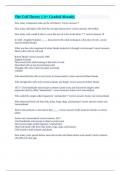
-
The Cell Theory || A+ Graded Already.
- Exam (elaborations) • 6 pages • 2024
-
- $10.69
- + learn more
How many component make up the cell theory? correct answers 7 How many individual cells does the average human have? correct answers 100 trillion How many cells would it take to cover the area of a dot on the letter "i"? correct answers 50 In 1665 - English Scientist, ____, discovered cells while looking at a thin slice of cork. correct answers Robert Hooke What was the cork comprised of when Hooke looked at it through a microscope? correct answers Dead xylem cells of cell wall ...
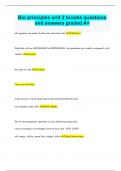
-
Bio principles unit 2 brooks questions and answers graded A+
- Exam (elaborations) • 36 pages • 2024
- Available in package deal
-
- $10.99
- + learn more
Bio principles unit 2 brooks questions and answers graded A+ all organisms are made of cells and come from cells Cell theory When the cell size (INCREASES or DECREASES), the membrane gets smaller compared to cell volume. increases the study of cells Cytology "how can cork float" Took sections, looked under microscope and found that they had tiny chambers (aka cells) Robert Hooke Part of electromagnetic spectrum via sun, delivering energy that can be recorded as waveleng...
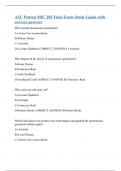
-
ASU Penton MIC 205 Final Exam Study Guide with correct answers
- Exam (elaborations) • 7 pages • 2023
- Available in package deal
-
- $13.99
- + learn more
Who created spontaneous generation? A) Anton Van Leeuwenhoek B) Robert Hooke C) Aristotle D) Lazzaro Spallanzi CORRECT ANSWER C) Aristotle Who disproved the theory of spontaneous generation? A)Louis Pasteur B) Francesco Redi C) John Needham D) Ferdinand Cohn CORRECT ANSWER B) Francesco Redi Who came up with term cell? A) Lazzaro Spallanzi B) Aristotle C) Francesco Redi D) Robert Hooke CORRECT ANSWER D) Robert Hooke Which individual viewed their own tooth plaque and sparked ...
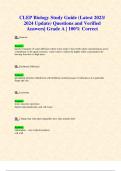
-
CLEP Biology Study Guide (Latest 2023/ 2024 Update) Questions and Verified Answers| Grade A | 100% Correct
- Exam (elaborations) • 37 pages • 2023
-
Available in package deal
-
- $10.99
- + learn more
CLEP Biology Study Guide (Latest 2023/ 2024 Update) Questions and Verified Answers| Grade A | 100% Correct Q: Osmosis passive transport of water diffusion where water seeks to have both solute concentrations across a membrane to be equal (isotonic). water wants to dilute the higher solute concentration by moving from low to high areas. Q: Facilitated Diffusion Answer: specialized proteins embeded in cell membrane permit passage of substances of a particular shape and size ...

Study stress? For sellers on Stuvia, these are actually golden times. KA-CHING! Earn from your study resources too and start uploading now. Discover all about earning on Stuvia


